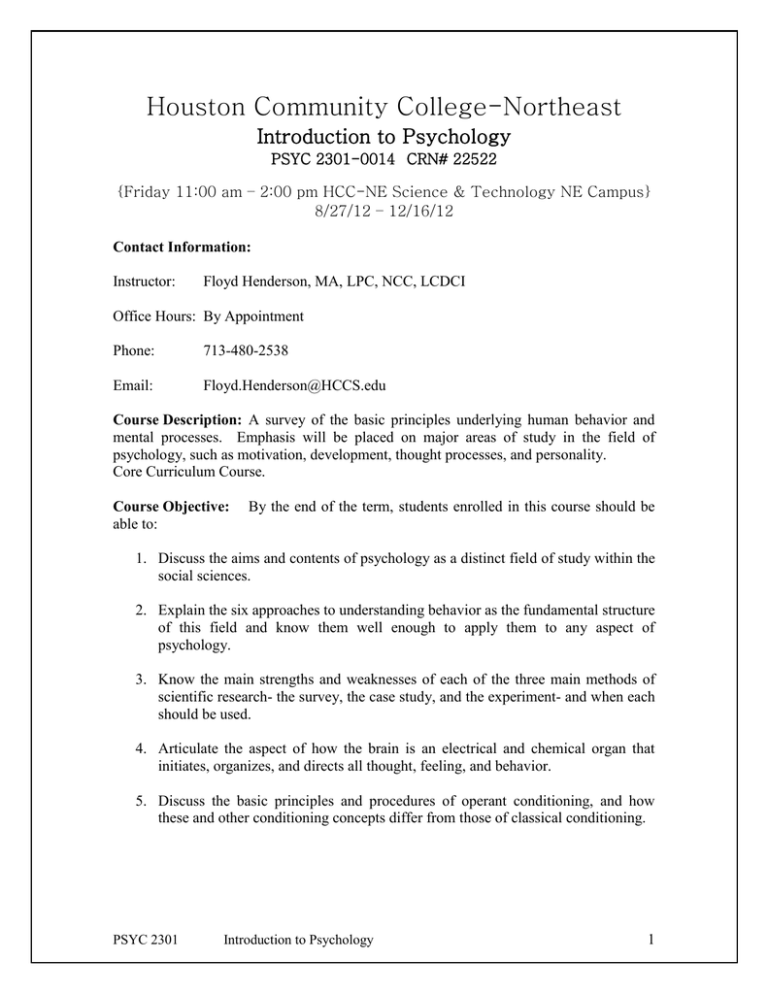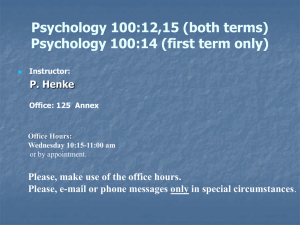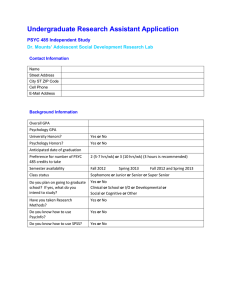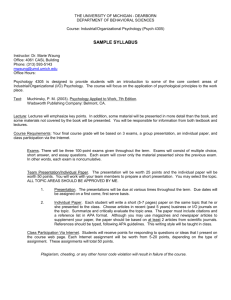2301Syll12FAllFRI.doc
advertisement

Houston Community College-Northeast
Introduction to Psychology
PSYC 2301-0014 CRN# 22522
{Friday 11:00 am – 2:00 pm HCC-NE Science & Technology NE Campus}
8/27/12 – 12/16/12
Contact Information:
Instructor:
Floyd Henderson, MA, LPC, NCC, LCDCI
Office Hours: By Appointment
Phone:
713-480-2538
Email:
Floyd.Henderson@HCCS.edu
Course Description: A survey of the basic principles underlying human behavior and
mental processes. Emphasis will be placed on major areas of study in the field of
psychology, such as motivation, development, thought processes, and personality.
Core Curriculum Course.
Course Objective:
able to:
By the end of the term, students enrolled in this course should be
1. Discuss the aims and contents of psychology as a distinct field of study within the
social sciences.
2. Explain the six approaches to understanding behavior as the fundamental structure
of this field and know them well enough to apply them to any aspect of
psychology.
3. Know the main strengths and weaknesses of each of the three main methods of
scientific research- the survey, the case study, and the experiment- and when each
should be used.
4. Articulate the aspect of how the brain is an electrical and chemical organ that
initiates, organizes, and directs all thought, feeling, and behavior.
5. Discuss the basic principles and procedures of operant conditioning, and how
these and other conditioning concepts differ from those of classical conditioning.
PSYC 2301
Introduction to Psychology
1
Textbook:
Weiten, W. (2011). Psychology Themes & Variations 8E Briefer Version. Eighth
edition, Wadsworth Publishers, Toronto.
ISBN
0-495-81334-6
Classroom Expectations: Please arrive on time, keep conversations to a minimum,
and have respect for the opinions of others. Students are not allowed to bring their
children to class. All cell phones and pagers must be turned to a discreet mode or off.
Following these rules will make the class a pleasant experience for everyone. Repeated
failure to follow the rules may result in a lower final grade.
Attendance: Classroom attendance is not graded (see the grading section below), but
regular attendance is strongly encouraged. Please notify the instructor if several classes
will be missed due to an emergency.
Exams:
This course has four unit exams worth 100 points each. The exams are
typically fifty to one hundred questions constructed in a multiple-choice format. Upon
completion of this course, students will demonstrate mastery of the course material via
the departmental final examination. Student in this course are responsible for knowing
all of the information covered in the lectures and assigned readings. Exam content is
about 80% from the textbook and about 20% from the lecture.
Students are responsible for taking exams at the scheduled times. Make-up exams are
only given to students who can provide documentation that they missed the exam due to a
serious illness or emergency. Make-up exams are given solely at the discretion of the
instructor and may be docked one or more letter grades depending upon the instructor’s
assessment of the situation. Students are responsible for making the arrangements to take
a make-up exam. All make-up exams must be completed before final exams begin.
No make-up exams are given for missed final exams unless the student can document an
emergency situation and obtain approval from the Dean of Academic Affairs.
ADA STATEMENT:
If you have a university-accepted disability and need special accommodations,
please contact the Office of Disability Support Services at (713) 718-8146
immediately. Once you have received a letter of adjustment from the disability office,
appropriate adjustments and modifications can be considered for the class. Please
refer to the Undergraduate Catalog for additional information. If you require
reasonable accommodations because of a physical, mental, or learning
disability, please notify the instructor of this course as soon as possible and
preferably before the end of the first two weeks of class to arrange for
reasonable accommodations.
*The instructor reserves the right to modify the syllabus during the semester.
** Please keep copies of all of assignments and handouts – including this syllabus.
PSYC 2301
Introduction to Psychology
2
Course Overview:
Unit I Topics:
The Evolution of Psychology; The Research Enterprise in Psychology; The Biological
Bases of Behavior
Readings:
Chapters 1, 2 & 3
Exam I:
September 28, 2012
Unit II Topics:
Sensation & Perception; Sleep and dreams; the affect of drugs and altered states of
consciousness; Learning
Readings:
Chapters 4, 5, 6 & 7
Exam II:
October 26, 2012
Unit III Topics:
Human Memory; Cognition & Intelligence; Motivation & Emotion; Human Development
Across the Life Span
Readings:
Chapters 8, 9, 10 & 11
Exam III: November 16, 2012
Unit IV Topics:
Health, stress and coping; assessment and anxiety disorders; mood disorders and
schizophrenia; styles and types of therapy; and social psychology.
Readings:
Chapters 12, 13, 14 & 15
Comprehensive Final Exam: Friday, December 14, 2012
Writing Assignment
I.
“Who Am I?”
Introspective writing assignment. Three pages, typed, double-spaced, 12-point font, 1”
margins. APA Style.
http://owl.english.purdue.edu/owl/resource/560/01/
Due Date: September 21, 2012
PSYC 2301
Introduction to Psychology
3
Other Important Dates:
August 31
September 3
September 10
November 18
November 21-25
December 12
December 13-19
Registration Ends: Last day to Drop/Add/Swap
Labor Day Holiday
Official Date of Record
Last day for Administrative/Student Withdrawals – 4:30pm
Thanksgiving Holiday
Last class day of Instruction for Fall Semester
Final exam period
Grading:
The total number of points accumulated during the term will be calculated
for each student at the end of the term. There are 500 points possible. Final letter grades
will be determined by applying the following percentage cutoffs to the total number of
points accumulated. The cutoffs will be strictly applied without rounding.
Grade:
A
B
C
D
F
PSYC 2301
Percentages:
90.0% TO 100.0%
80.0% TO 89.9%
70.0% TO 79.9%
60.0% TO 69.9%
Less than 60%
Total Points:
450 to 500
400 to 449
350 to 399
300 to 349
Less than 299
Introduction to Psychology
4
Course Outline:
WEEK OF DATE: DAY
Intro 08/28
F
TOPIC:
Course Introduction
Chapter 1: The Evolution of Psychology
WK1 09/07
F
Chapter 1 continued
Chapter 2: The Research Enterprise in Psychology
WK2 09/14
F
Chapter 2: Continued
WK3 09/21
F
Chapter 3: The Biological Bases of Behavior
Introspective writing assignment due
WK4 09/28
F
Exam 1 (Chapters 1-3)
Unit II overview (Chapters 4, 5, 6 & 7)
WK5 10/05
F
Chapter 4: Sensation and Perception
WK6 10/12
F
Chapter 5: Variations in Consciousness
WK7 10/19
F
Chapter 6: Learning
Chapter 7: Human Memory
WK8 10/26
F
MID TERM EXAM (Chapters 4 – 7)
Unit III overview (Chapters 8 - 11)
WK 9 11/02
F
Chapter 8: Cognition and Intelligence
WK10 11/09
F
Chapter 9: Motivation and Emotion
Chapter 10: Human Development/Life Span
WK11 11/16
F
Chapter 11: Personality: Theory, Research
Exam 3 (Chapters 8-11)
WK12 11/23
F
Chapter 12: Stress, Coping, and Health
Overview Unit IV (Chapters 12-15)
WK13 11/30
F
Chapter 13: Psychological Disorders
WK14 12/07
F
Chapter 14: Treatment of Psychological Disorders
Chapter 15: Social Behavior
WK 15 12/14
PSYC 2301
F
COMPREHENSIVE FINAL EXAM
Introduction to Psychology
5
Academic Dishonesty: Any form of academic dishonesty will result in a final grade of
“F” for those involved and disciplinary action from the college. Academic dishonesty
includes the following: cheating (for example, discussing exam questions with students
who have not yet taken the exam), plagiarism (copying the intellectual work of others
without giving the original author proper credit), unauthorized collaborations,
falsification of information, and submission of written papers to more than one class. In
addition, stealing or destroying library materials is not acceptable.
Additional Information:
Each student is to provide and maintain an email account
throughout the duration of this course. The student will be responsible for maintaining
and checking this email account on a weekly basis. The instructor will utilize this format
to communicate messages, exam information, and assignments to the students.
Psychology Resource:
An outstanding resource for the psychology student is the
Psych Web, http://www.psychwww.com.
The Psych Web contains APA style resources, books, brochures, journals, an updated
version of the APA Manual Crib Sheet, Psychology departments on the web, careers in
Psychology and self-quiz sections.
PSYC 2301
Introduction to Psychology
6



